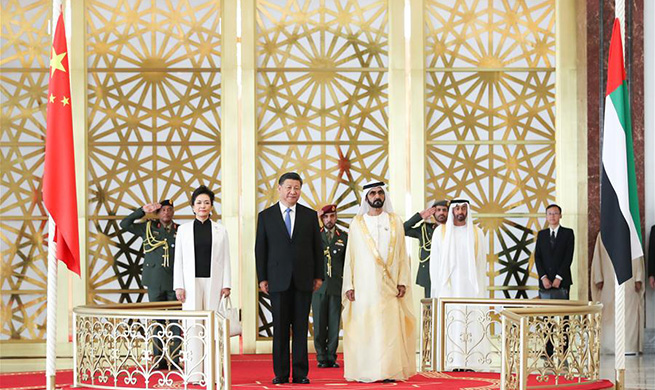BERLIN, July 20 (Xinhua) -- The German government is not convinced by British proposals for a new relationship between the European Union (EU) and Britain after the country leaves the bloc, Germany's Europe minister Michael Roth (SPD) told the public broadcaster ZDF on Friday.
Speaking to ZDF, Roth warned that German government had serious doubts about the feasibility of bilateral arrangements outlined in a Brexit White Paper which was recently unveiled by British Prime Minister Theresa May. "We still have many, many questions," Roth said.
The German Europe minister was unwilling to predict on Friday whether a so-called "Hard Brexit", in which Britain leaves both the EU single market and customs union, could still be averted. In any case, he noted, the EU and the United Kingdom would both always be "worse off" compared to the status quo.
Roth described Brexit as a "tragedy" in which Germany and its fellow EU member states could only attempt to limit the resulting damage as much as possible.
"Our key priorities are the unity of the remaining 27 EU members, the integrity of the single market and that we can continue to cooperate with the United Kingdom as closely as possible," he told ZDF.
The SPD politician further highlighted that Berlin would resist any attempt by the United Kingdom to engage in regulatory "cherry-picking" which diluted the EU's four founding freedoms for the movement of people, goods, services and capital across the bloc.
In a recent report, the Federation of German Industries (BDI) warned that while Brexit would harm the EU as a whole, the United Kingdom would itself be most affected by its adverse economic impact.
The country has been the worst performing economy in the EU in terms of gross domestic product (GDP) growth since voting to quit the bloc in 2016 and has since seen a steep drop in foreign direct investment (FDI).
BDI director Dieter Kempf consequently argued that the United Kingdom would be best advised to emulate the quasi-EU membership models of Norway and Switzerland to avert material damage and protect the current rights which its own citizens enjoy throughout the EU.
Norway and Switzerland are both members of the EU Schengen travel area and customs union, abide by its four freedoms of goods, services, capital and people, and are subject to the jurisdiction of the European Court of Justice (CJEU).
London has consistently rejected proposals to opt for a similar arrangement on the grounds that voters had given the government a mandate to "take back control".
While trying to restore calm between rivaling "hard" and "soft" Brexiteer factions in her conservative party, Prime Minister May has instead sought to pressure the EU to accept the vision for a vaguely-defined "bespoke agreement" set out in the Brexit White Paper.
A key sticking point in negotiations is the situation of the land border between the Republic of Ireland and United Kingdom, an issue on which the British cabinet is also split internally.
In an unusually confrontational Belfast speech on Friday, an increasingly-embattled May called on Brussels to "evolve its views" on the issue in line with her own.
Brussels has so far shown no inclination of reneging on an earlier pledge to prevent the erection of an Irish land border, however, and has told member states to begin preparing for a "no deal" scenario in which the UK crashes out of the bloc without any agreement. In order to avert such an outcome, London would have to ratify a Brexit deal by March 29 of 2019 at the latest.
EU officials are meeting in Brussels in the course of Friday to discuss potential solutions to the current impasse.













